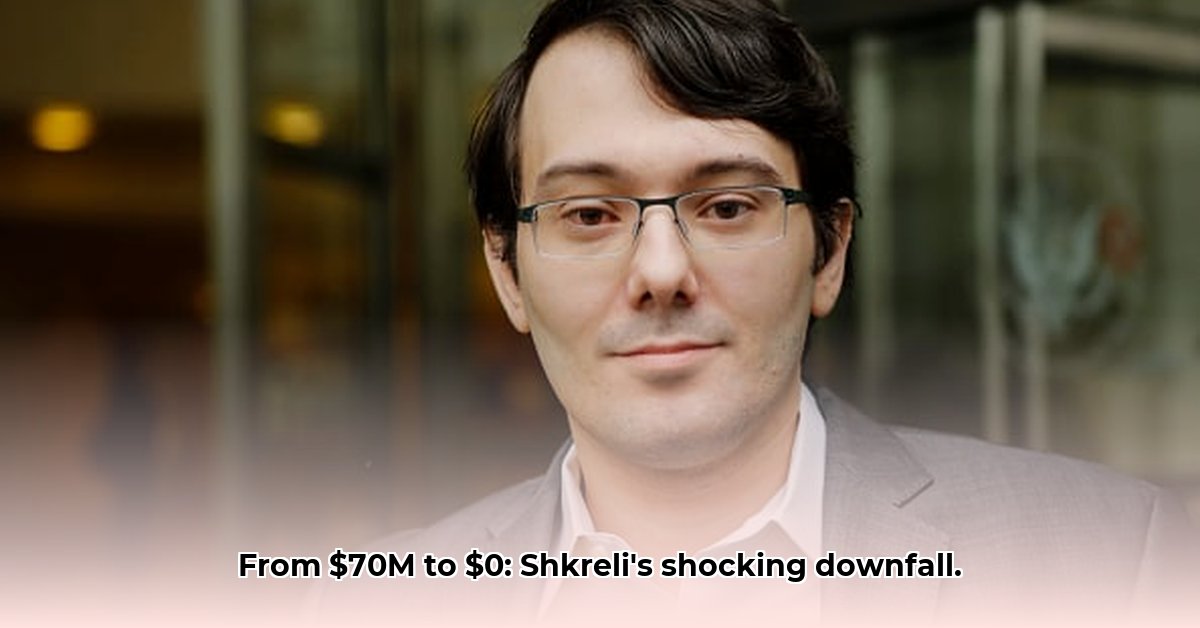
The Meteoric Rise and Spectacular Fall of Martin Shkreli
Martin Shkreli's trajectory from multimillionaire pharmaceutical CEO to convicted felon and financially destitute individual is a compelling narrative of ambition, controversy, and ultimately, ruin. His story, marked by both shrewd business acumen and ethically questionable decisions, serves as a cautionary tale for the pharmaceutical industry and beyond. How did a man once estimated to be worth $70 million end up with nothing? The answer lies in a complex interplay of business dealings, regulatory loopholes, and a spectacular public backlash.
The Daraprim Debacle: A 5,000% Price Hike Ignites Outrage
Shkreli's infamous actions while CEO of Turing Pharmaceuticals catapulted him into the public eye. His decision to raise the price of Daraprim, a drug used to treat toxoplasmosis, by a staggering 5,000% – from $13.50 to $750 per pill – drew widespread condemnation. This drastic price increase, affecting patients already struggling with serious health issues, sparked outrage and ignited a national debate about pharmaceutical pricing and corporate ethics. Did this controversial move directly precipitate his financial downfall? While not the sole cause, it certainly played a significant role.
How could a single decision have such far-reaching consequences? The answer lies in the intersection of a lack of competition in the market for Daraprim and the lack of public sympathy for Shkreli’s actions.
Beyond Daraprim: Securities Fraud and the Legal Reckoning
The Daraprim price hike wasn't the only factor contributing to Shkreli's financial ruin. He also faced separate and unrelated charges of securities fraud, involving accusations of misleading investors about the performance of his hedge funds. This led to a trial and subsequent conviction, resulting in a prison sentence and the forfeiture of a significant portion of his assets. This legal battle further exacerbated his already precarious financial situation.
The timeline highlights the rapid erosion of Shkreli’s wealth:
| Year | Estimated Net Worth (USD) | Major Events |
|---|---|---|
| 2015 | ~$70,000,000 | Peak net worth; Daraprim price increase |
| 2016-2017 | Decreasing Rapidly | Securities fraud charges and investigation |
| 2018 | Significantly Reduced | Conviction; asset forfeiture begins |
| Present | $0 | Assets forfeited; serving prison sentence |
This table illustrates the dramatic shift from immense wealth to complete financial ruin.
A Ripple Effect: Impact on Pharmaceutical Pricing and Regulation
Shkreli's actions had repercussions far beyond his personal finances. His case became a potent symbol of public anxieties surrounding exorbitant drug pricing and the ethical responsibilities of pharmaceutical companies. It sparked a crucial national conversation, prompting calls for greater transparency and stricter regulations within the industry.
What lessons can be learned from Shkreli's downfall? The case underscores the importance of ethical business practices, regulatory compliance, and a profound understanding of corporate social responsibility.
“Shkreli’s actions highlighted a critical gap in pharmaceutical regulation and the ethical dilemmas corporations face when profit maximization outweighs patient welfare,” states Dr. Anya Sharma, Professor of Pharmaceutical Ethics at Columbia University.
Preventing Future Pharmaceutical Price Gouging: Lessons from the Daraprim Case
Key Factors Contributing to the Daraprim Crisis:
- Lack of Competition: Limited generic alternatives allowed for unchecked price increases.
- Regulatory Gaps: Slow generic drug approvals created opportunities for exploitation.
- Ethical Failures: Prioritizing profit maximization over patient well-being.
Steps to Mitigate Future Price Gouging:
- Strengthen Antitrust Regulations: Prevent monopolies and foster competition in the pharmaceutical market.
- Accelerate Generic Drug Approvals: Streamline the regulatory process to increase the availability of lower-cost alternatives.
- Enhance Transparency: Mandate greater transparency in drug pricing and manufacturing costs.
- Implement Ethical Guidelines: Establish clear ethical standards for pharmaceutical companies.
The Martin Shkreli saga serves as a stark reminder: unchecked corporate greed coupled with regulatory loopholes can have devastating consequences for patients and the public trust. The path forward requires collaborative efforts from pharmaceutical companies, regulatory bodies, and governments to prevent similar crises in the future.